#historical context
Text
Travels with Jonathan Harker, in pictures
If our good friend Jonathan Harker had sent us some photos along with his lovely email, here's what he might have included. All photos are as close to contemporary as I could find.
Left Munich at 8:35 P. M.:

arriving at Vienna early next morning:
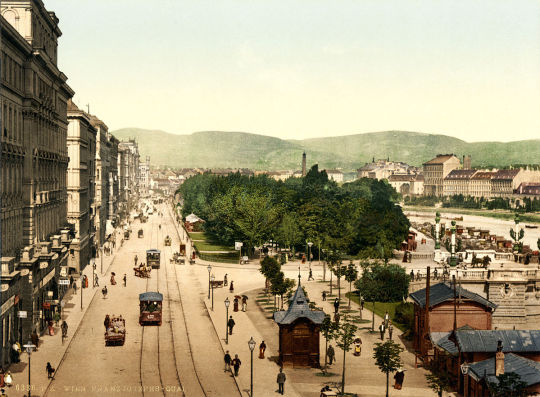
Buda-Pesth seems a wonderful place, from the glimpse which I got of it from the train and the little I could walk through the streets:
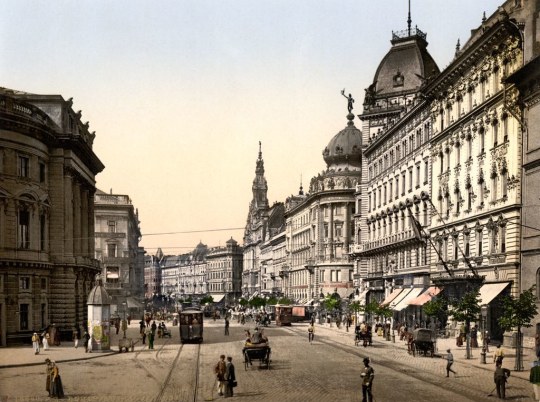
We left in pretty good time, and came after nightfall to Klausenburgh:

All day long we seemed to dawdle through a country which was full of beauty of every kind. Sometimes we saw little towns or castles on the top of steep hills such as we see in old missals:

sometimes we ran by rivers and streams which seemed from the wide stony margin on each side of them to be subject to great floods:
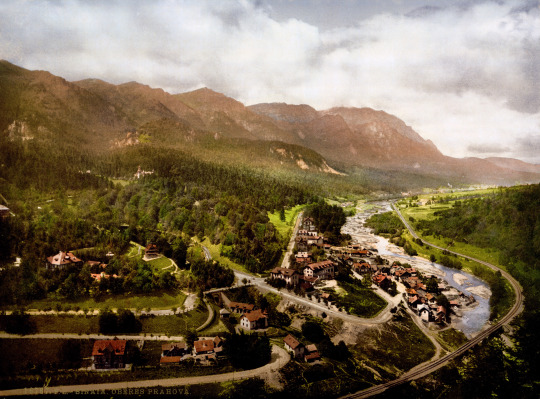
The women looked pretty, except when you got near them, but they were very clumsy about the waist. They had all full white sleeves of some kind or other, and most of them had big belts with a lot of strips of something fluttering from them like the dresses in a ballet, but of course there were petticoats under them:
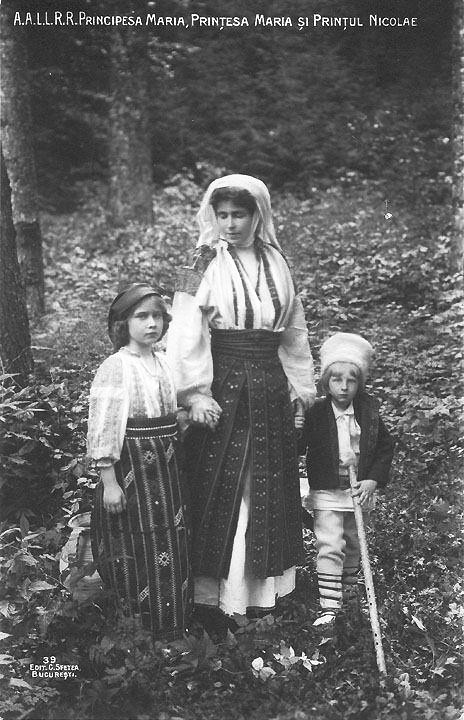

(on the left: the Romanian royal family in peasant cosplay in the early 1900s; on the right, a photoshoot of Romanian national dress in 1868)
It was on the dark side of twilight when we got to Bistritz, which is a very interesting old place:
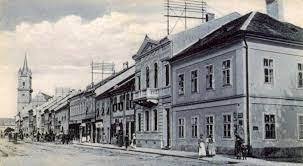
Bonus: a postcard Jonathan might have picked up for Mina.

7K notes
·
View notes
Text
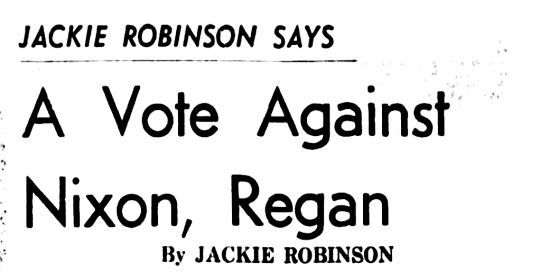

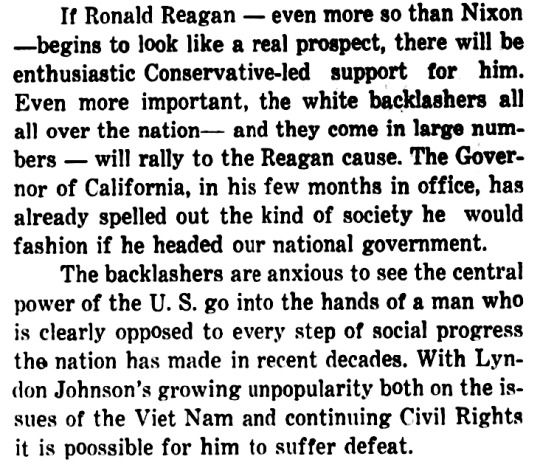


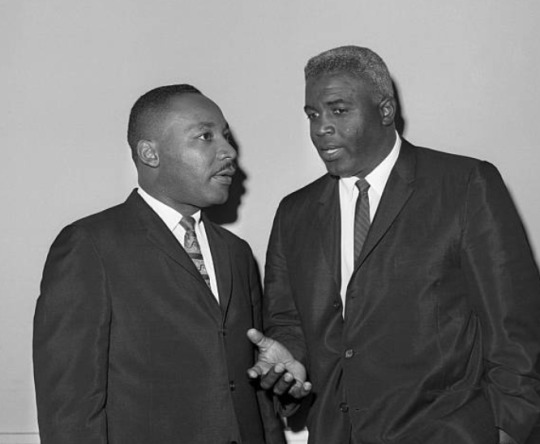
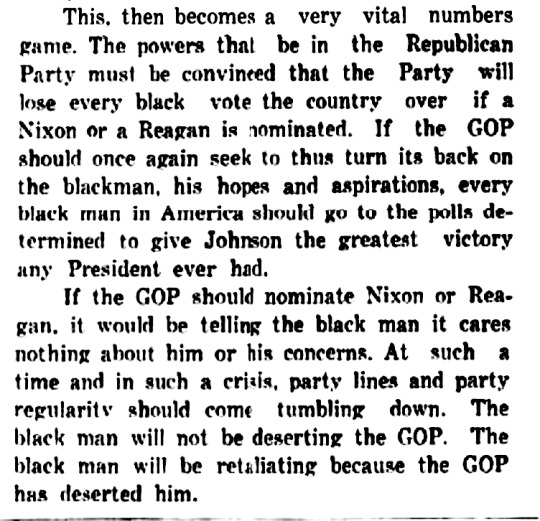

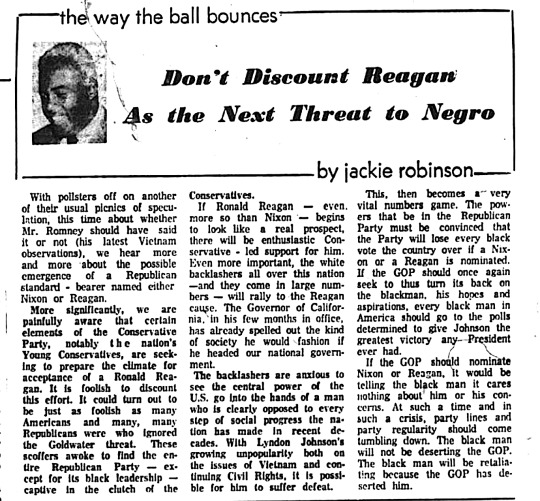
In an editorial published in the Pittsburgh Courier on September 30, 1967, baseball legend Jackie Robinson warned that Ronald Reagan would roll back all the gains made by the Civil Rights Movement, from the Voting Rights Act to Affirmative Action.
996 notes
·
View notes
Text
Now some Vampire Lore, which also explains why Lucy mainly attacks children and is Voluptuous. Other than children being a much easier, vulnerable target for a new vampire, especially at night, and vampires being attractive to lure people to them:
One of Stoker's primary sources was Ármin Vámbéry, a Hungarian-Jewish traveler and orientalist. Van Helsing even gives him a shout-out in the book later. Stoker consulted him a lot about the legends in the Balkans and Austria-Hungary (where Transylvania was at the time).
Dracula is heavily based on the area's Strigoi. And partly on the Estries (which are associated with the Succubi: Beautiful, blood-thirsty female demons, with succubi thought to favor babies and young children as prey.) The Strigoi are closer to what we know as vampires due to them rising from the grave, or being created by something unholy. So Lucy turned into a child-drinking succubus.
The Strigoi and Estries both:
Gain vitality by drinking human blood
Can shapeshift into animals
Influence people's minds
Mainly feed on infants
the Strigoi target also young girls, the Estries all genders but mostly men
On the child feeding, Wilhelm Schmidt reports in 1865 the tradition "upon the birth of a child, when one tosses a stone behind oneself and exclaims "This into the mouth of the strigoi!" Note the stones found in the skulls of people suspected to have been vampires.
There are striking similarities between them and the Estries. Note the common "strix" root. Screaming is also a feature that they have, which is similar to the banshee, but this attribute is not as prominent in Dracula yet.
More about the Count and less about Lucy: The Strigoi are associated with sorcery, something that will be relevant in Dracula. The Strigoi influence people's minds, especially those who are ill, have sleeping issues, suffer from alcoholism, and more. This is shown by Dracula's influence on the sleepwalking Lucy and likely on Renfield.
#dracula daily#re: dracula#historical context#count dracula#lucy westenra#jack seward#mythological#dracula#jonathan harker#cw child death mention
674 notes
·
View notes
Text



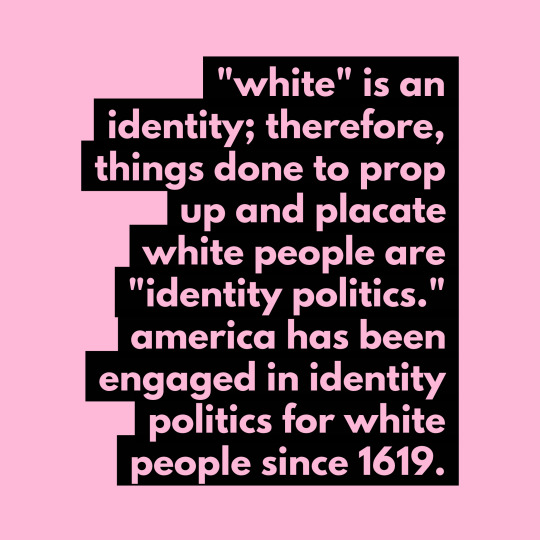

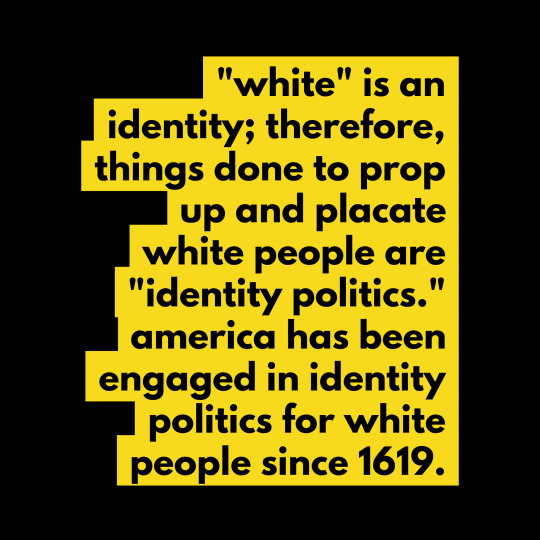



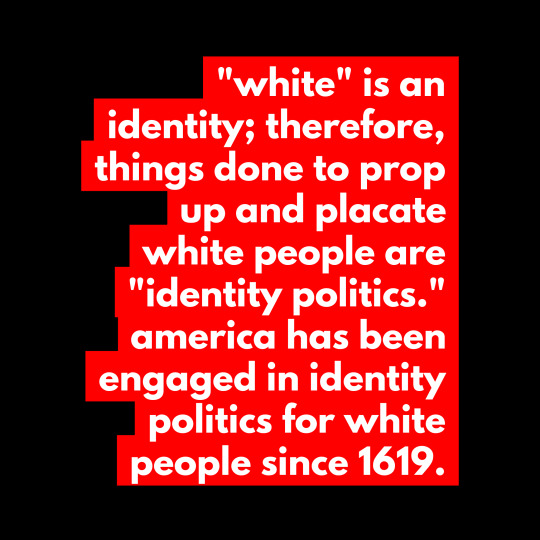
for the people who missed it the first time
#white identity#identity politics#america#history#1619#racial identity#social dynamics#racial politics#historical context#white supremacy#racism#social justice#equality#end hate#anti-racism#racial equality#stop racism#no to hate#dismantle racism
117 notes
·
View notes
Text
"Authenticity" is hard to capture when adapting Les Misérables, because as @secretmellowblog, @pilferingapples, and others have pointed out, it was already a period piece when it was published, and Hugo used events of the past to address current social issues.
Hugo used the 1832 June Rebellion to comment on the 1848 Revolution and as a veiled call to arms against Napoleon III.
A century later, Boublil and Schönberg wrote the musical, and as @pilferingapples has said, they seem to have let the student protests of May 1968 (which took place in their youth) influence their view of the June Rebellion. Hence the lines in the musical that seem to paint it as a naïve endeavor by inexperienced schoolboys, which ignore the historical fact of the 1830 Revolution.
So what we see in the stage musical is 1832 through the lenses of 1848 and 1862, through the lens of 1968.
Then when the 2012 film version of the musical was released, Tom Hooper cited Occupy Wall Street as a source of inspiration. So what we get is 1832 through the lenses of 1848 and 1862, through the lens of 1968, through the lens of 2011.
Of course this just shows that the themes are always relevant. But if the real revolutionaries of 1832 were to see all of this, I'm sure they would point out some distortions in each new telling.
264 notes
·
View notes
Text
Jonathan Harker praises the bottle of Tokaji wine he was served at Dracula's Castle on his first night there.
Tokaji is one of the oldest dessert wines. Sweet, intense in flavor, and prestigious. Produced in Tokay, Hungary since the 16th century. Most often paired with spicy and hot dishes.
Apparently Jonathan enjoys sweet, intense wines.
Erik in The Phantom Of The Opera novel offers Tokaji to Christine Daaé during her first visit in his lair.
Mephistopheles in Goethe's Faust serves it to the young lovestruck Siébel. (Siébel: 'No wine for me can ever be too sweet.' Mephistopheles: 'My best Tokaji shall presently appear.')
In the 19th century it was used as a remedy for plague and anemia
(all this occurred to me thanks to @wheresjonno while thinking about what Jonathan would enjoy in a euro food tour)
#in the 19th century it was used as a remedy for plague and anemia#dracula daily#jonathan harker#dracula#re: dracula#the phantom of the opera#faust#poto#wine#historical context
387 notes
·
View notes
Text
I Feel You Linger In the Air
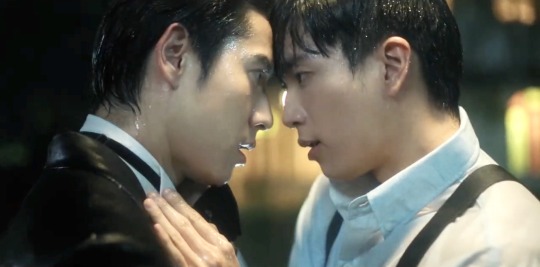
You ready for this?
The quickest of quick thoughts: I loved this show and hated the ending, but not for the reason you think.
This is gonna be one of my big meta beast-sized posts, skip to the end for the final review.
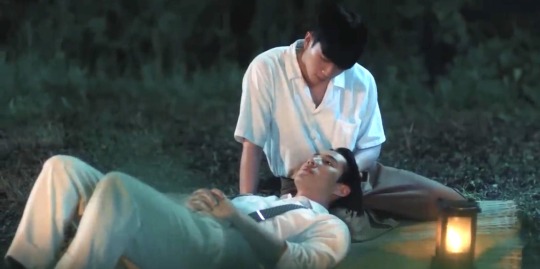
Some Historical Context for I Feel You Linger In The Air - Thailand 1925-1932
I love history and so here's some info that any Thai watcher would likely know, but the rest of us might not... ready?
The Historical Stage:
Burma (now Myanmar) to the west is occupied by the British.
The French hold Vietnam to the east.
Everyone is bickering over what would become Cambodia & Laos.
China occasionally gets involved from the North (also, lots of immigrants from China at this time accounting for a large percentage of the merchant/middle class)
Eventually, Japan would invade during WWII.
In part, The Kingdom of Siam was kept a "neutral" party because none of the surrounding colonial powers wanted to risk offending any of the other players in the area.
Siam re-negotiated sovereignty in 1920 (from USA) and in 1925 (from France & Britain). But during the time of this show (late 1929) it was back to it's customary type-rope balancing act of extreme diplomacy with the allied western colonial powers that surrounded it.
Recognizing that Thailand was never colonized (although it was invaded), it's boarders were constantly nibbled at and it was "ambassador-occupied" off and on by westerners whose military backing and exploitive business concerns simply outmatched the monarchy, especially in the technology department (as well as by reputation on the global stage at the time).
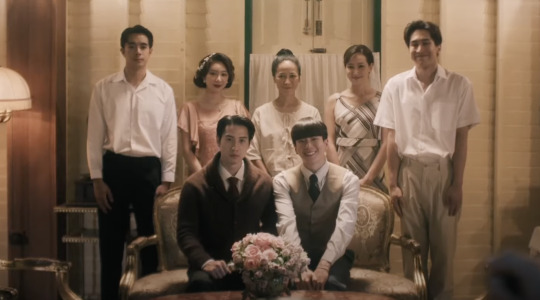
In other words, the farang in this show (James & Robert) were always gonna be both the baddies and the power players of the narrative. (Farang is the Thai word for non-Thai's of European descent, the word means guava.)
The king of Siam at the time (Vajiravudh AKA Rama VI) was initially somewhat popular but also regarded as overly extravagant since Siam had been hit by a major postwar recession in 1919. It should also be noted that King Vajiravudh had no son because he was most likely gay (which at the time did not much concern the Siamese popular opinion, except that it undermined the stability of the monarchy leaving it without an heir).
He "died suddenly" in 1925 (age 44) with the monarchy weakened and succession handed off to his younger brother.
In 1932 a small circle of the rising bourgeoisie (all of whom had studied in Europe, mostly Paris), supported by some military, seized power from the monarchy in a practically nonviolent Siamese Revolution installing a constitutional monarchy. This is mentioned in IFYLITA in the last few episodes but did not (apparently) appear in the original novel.
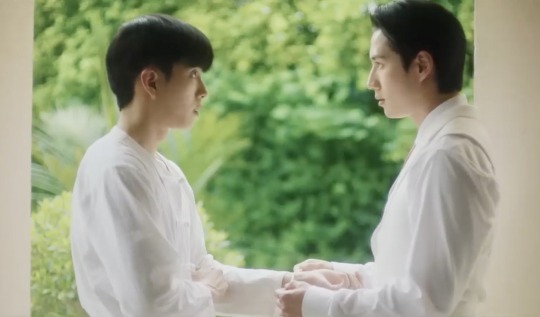
Siam would then go through:
dictatorship,
WWII,
Japanese invasion,
Allied occupation,
democratic elections,
military junta,
the Indochina wars,
communist insurgency,
more democracy and popularization movements,
multiple coups,
more junta,
more monarchy,
eventually leading us to the somewhat chaotic insanity of Thai politics we have today. (Which is, frankly, a mix of monarchy, junta, democracy, egocentric popularism, and bribery.)
The Filming of I Fell You Linger in the Air
The director if this show, Tee Bundit (Hidden Agenda, Step by Step, Lovely Writer, TharnType), has never particularly impressed or offended me as a director. I would have called him simply "workmanlike" in execution: not offensive, serviceable.
So much so that I spent some time hunting for info on IFYLITA's cinematographer (who remains uncredited on MDL) because this one, of all Tee's pantheon, is ultra stylish. It, frankly, felt too good for him.

Specifically, there is a repeated visual motif in intimacy scenes of either Yai or Jom being filmed from behind a screen/drape/curtain making them seem more translucent, like a ghost or spirit. While the other half of the pair is filmed with sharp clarity. In the first half of the series this is more likely to be Yai (an unknown and mysterious element), as the show progresses, it's more likely to be Jom (the person outside of place and time, destined to vanish all together). This cleverly conveys story, tension, and foreshadow (future shadow?)
Occasionally we shift over so they both become obscured and then clear again.
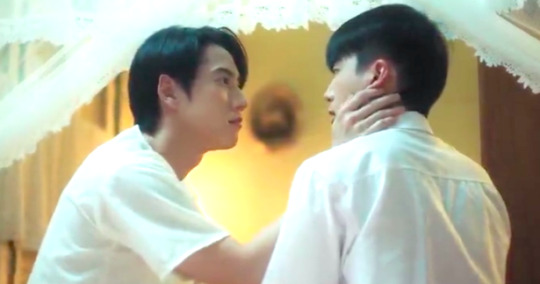
This stylized version of dirty framing and filters is used to foreshadow and then constantly remind us about that Jom slipped (and is slipping) through time and the disconnect that causes to his sense of reality and purpose, and to his burgeoning relationship.
For example, the scene where Yai is drunk and asleep in his bed. The first time Jom is sitting in a chair drawing him. Yai is blurry behind the screen while Jom is solid and sharp.
This filming technique combined with dirty and peekaboo framing is being used to give the watchers the impression of looking at something we maybe shouldn't, like we are being creepy and intruding on their private time. After all, they can see EACH OTHER clearly, it's only us who have the visual impairment.
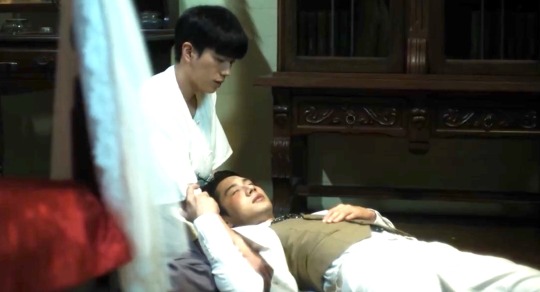
This gives us a sense of doom and discomfort and slight sensation that we shouldn't be there. We shouldn't be watching. But ALSO that we too are outside of time, filtered by the future.
In other words his sense of displacement is being used to trigger ours visually.
It's all quite clever.
It's both beautiful and atmospheric and discomforting and touch stressful. Meaning that it is ALSO a visual vehicle to drive narrative tension. As effective as scary music, perhaps more so in this show (since I personally found the musical motifs and refrains somewhat overused.)

Linguistic corner
The word for reflection and shadow is the same in Thai.
Note on the por/phor/phô honorific in Thai
I have not encountered it before in BL. I am indebted to @embraceyourfandom for the following information;
Phô is a paternal honorific, luang phô is used for respected monks. It basically means father. And is oft seen as male honorific for village elders. It's also used as a male prefix in the names of several occupations like:
พ่อครัว phô khrua (khrúa= kitchen -> chef)
พ่อค้า phô khá (khá= trade -> merchant)
พ่อมด phô mót (mót= person of occult knowledge -> wizard)
พ่อบ้าน phô bân (bân =house -> butler) - most relevant
So, Yai's use is probubly foreshadowing that Jom will be a butler for his house, and is primitively referring to him with this title.
All that said, phô can also be used by a "man who is older/higher on hierarchy to refer to a younger/lower on hierarchy man with intimacy and/or affection."
I think all this has to do with Jom's demonstration of education. Yai figured out early on that one of the reasons Jom doesn't belong and cannot fit in with the servants is that he is more educated than a peasant (of this time period), which for Yai adds up to him being originally from a higher status and possibly wealthy family, especially since Jom speaks English and has travelled (he has a non-northern accent).
There is very little Thai middle class at the beginning of the 1920s since trade is being dominated/dictated by the West, or Chinese merchant operations, and Siam is a monarchy. So for a nationalize Thai citizen educated means military, landed gentry with trade operations (like Yai), royal/political/diplomatic connections, or... none of the above. This changes, especially in the south, throughout this decade (as it did in other parts of the world). So there is a rising bourgeoisie going on in the background but it's not that obvious in Chang Mai at this time.
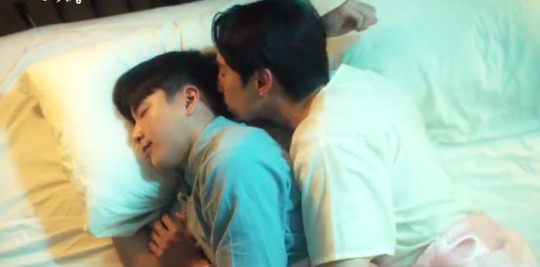
What Jom's educated lack of status means to Yai is that Jom's family either got wiped out or politically disenfranchised possibly as part of the 1912 attempted coups (or even WWI)? This would be mystifying for Yai because Jom doesn't act like he comes from a military family at all. So his background and status is very confusing for Yai, but Yai does know one thing...
Jom is NOT lower class by the standards of Yai's temporal worldview and existence.
For a young man to be educated and yet entirely alone is very dangerous and suspicious. Also, let's be clear, Jom doesn't look or act like a laborer. He red flags "cultured" all over the place.
Yai is paternalistic and caring towards Jom out the gate because Yai has a big ol'crush but also because he recognizes "his own" is trying to survive while isolated and scared.
Yai wants to rescue Jom. Yai is an ineffectual 20 year old gay intellectual. But poor thing sure tries.
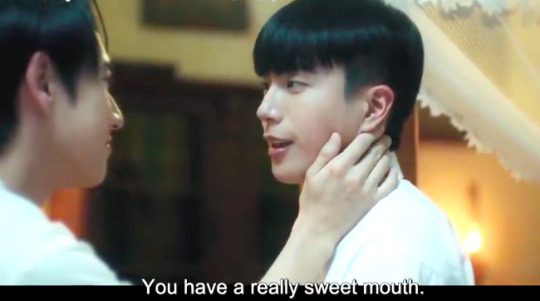

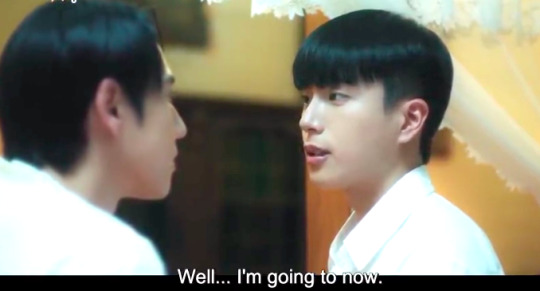
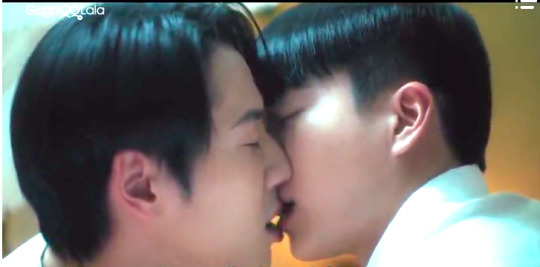
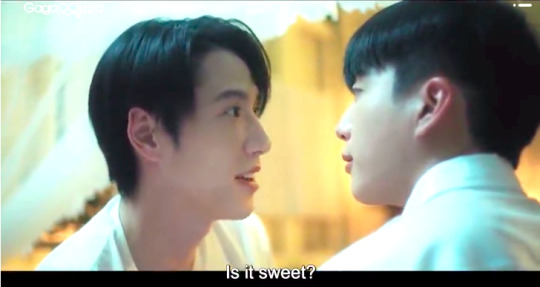
Let's Talk About How I Felt About I Feel You Linger in the Air
The historical aspect was great.
I adore historical romances and we almost never get them in BL. I was always gonna be biased towards this show. (As indeed I am towards Nobleman Ryu's Wedding, Tinted with You, and To Sir With Love.) Aside from some classic Thai BL production issues (less than normal, this is very high production value for Thailand) and my issues around the sound track and repetitive repriens (which frankly were more noticeable because I binged the last half) I have no complaints on that score (heh heh).
The surrounding support cast were all quite good and we even got us some lesbians!
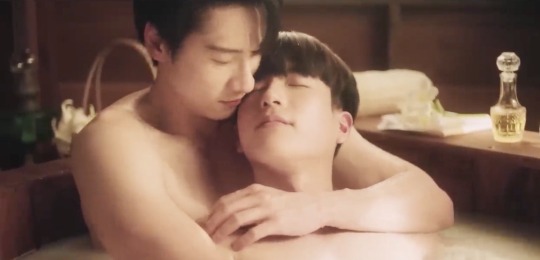
The emotional and narrative tensions were excellent.
Any issues I had with pacing came from focus on characters that didn't interest me, but probubly did interest others. I wasn’t wild or particularly interested in the family drama or the side characters/couples, but they were necessary to make this a fully fleshed story with historical context and to give Yai much needed characterization. Also this use of a ensemble cast is very close to Thailand's lakorn heart, even thought this one had way less scenery chewing ludicrous soapy drama (thank heavens).
I was delighted that external threat, stressors, and conflict drove this plot. That's refreshing in BL.
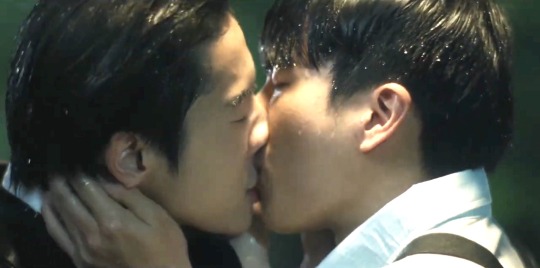
I have no arguments with the chemistry and kisses and sex scenes were tasteful and lovely, occasionally even heart-wrenching, and it's nice to see Thailand especially use physical intimacy to drive plot, and not the other way around.
I love historicals partly because every tiny touch can have such lingering significance, they're very elegant in their chaste physicality. This show didn't need to move into higher heat, but I'm grateful it did because even that was very well done. Thai BLs can often feel clumsy around intimacy, but not this one.
The final sex scene before Jom and Yai separate forever utilizes the ubiquitous director's-favorite-romantic-moments-flashbacks (required of all Asian romance dramas) but with acceleration and tension driven by the noises of sex, which I've never seen/heard done before. In other words: climax of sex = climax of the romance story, I see what you did there, Tee. Clever. Very clever. Bit on the nose… erm… on the… well you know what I mean.
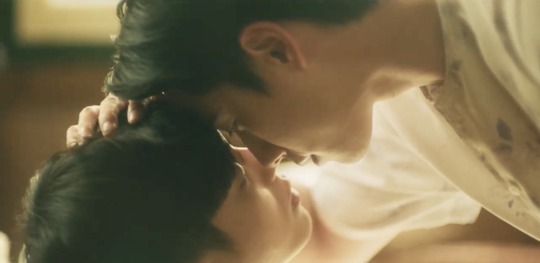
Like all Thai BLs this wasn’t perfect, but for me this is as close as Thai BL gets to high quality romance and that’s what I want the most from my drama watching experience (if not necessarily my Thai BL experience).
But... and you knew the but was coming didn't you?
I absolutely hated the ending.
It wasn't sad, don't worry, but it also wasn't good.
There is a long drawn out separations sequence and then Jom returns to the present, drowning from a car accident. Jom is "rescued" by an moustachioed iteration of Yai from the distant past (who we met once before) and then wakes in hospital. Some time later, Jom returns to the house in Chang Mai where Yai turns up and they reunite.
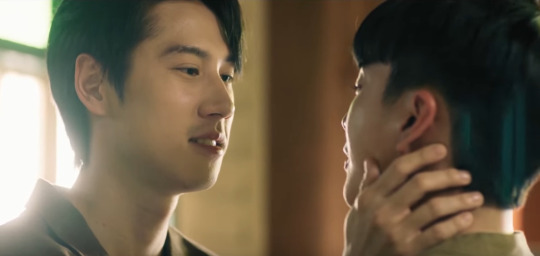
The end.
There is a stinger featuring Jom once more hurled back in time, only further, meeting the warrior mustache Yai once more.
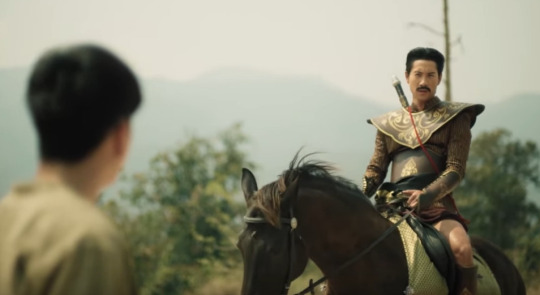
Okay, that's all I knew and all I saw.
Confused? So was I.
If this had been a regular time travel romance: Yai would have been the EMT or doctor attending Jom when he woke up and their "this time period" romance would commence. With either shared memories, or not.
Had this been set up for audience comprehension in line with the original novel, we should have had flashbacks from both Present Yai (he's not the same one, as it turns out) and deep-past Moustache Yai interwoven throughout the series. Preferably with some focus on Present Yai's quest for reunion with Present Jom AND Present Yai's own experience with visions and memory of his past lives.
A full explanation of the ending is here. This explanation of the 3 different Yais makes me like our ending more. But I shouldn't need to read Cliff's notes from some random y-novel reading fan on Tumblr to understand what's going on in a series!
There is supposedly a special happening with Jom + Present Yai.
There was unquestionably a failure in adaptation in the finale of this show.
As a fan and watcher, what I actually felt was deeply confused and hurt.
I also felt that this was a disingenuous un-earned throw away happy ending, since I had no idea who this new Present Yai was and no investment in his character. I simply didn't believe he was the same Yai (Bright is too good an actor, he was clearly a different older personality).
So the fact remains that past Yai, our Yai, the 20 year old boy we grew to understand and love, is abandoned in the past to suffer alone for the rest of his life. And THAT is an unhappy ending for one half of my beloved pair. Yes Jom gets a new Yai in the present day, but it's not the same Yai. They have no developed relationship, and Jom is doomed to leave even this new Yai and slide into the past once more. That's barely even happy for now for Jom's character.
As a result of my deep sadness for 20-year-old Yai in particular, I'm not going to be able to rewatch this show. The whole thing was rendered not just confusing but the opposite of comforting by the final 15 minutes. I'm tempted to dock it two whole points - one for the ending and the other for the lack of rewatch potential.
But the first 11.5 eps were SO GOOD.
This is one of the only times where I am actually hoping for a second season, while simultaneously being wary of the screen writing and production team's capacity to give us a satisfying one.
Industry wise? I honestly don't think we can hope too hard for a full season 2. This was an expensive show with flawed/limited distribution and little sponsorship. I don't see how they'll get funding for a second season. Unless we see this show up on like Netflix or Viki, I urge you not to hope too hard and be disappointed.
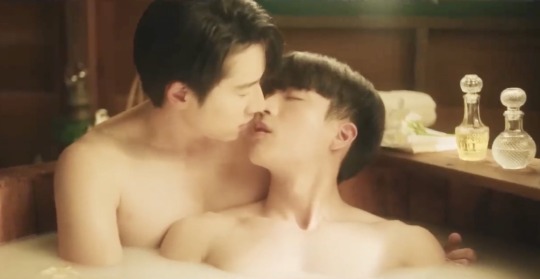
In all honestly?
I started typing up this blog post thinking Thailand was finally, after 5 years, going to earn another 10/10 from me but I just can't in good conscious give it that. It's been days and I'm still upset about that last episode.
And Now My Quick Pitch Review
I truly loved this time travel romance. IFYLITA is an exquisite BL, from filming techniques to narrative framework (much like Until We Meet Again). Steeped in history and family drama it edges into lakorn (but no as much as To Sir With Love and with way less scenery chewing). This is an elegant and classy BL... from Thailand which normally doesn't even try for classy. The main couple (both as a pair and individuals) were excellent, particularly Bright (Yai) whose eye-work acting style is a personal favorite of mine. Pity about the ending. Oh it wasn’t that sad but it wasn’t good either. This show should easily have earned a 10 from me except that it fumbled the… erm… balls. Argh. Whatever. 9/10
(source)
This post is also in My Drama List as a review.
#I Fell You Linger in the Air#Thai BL#BL review#I have LOTS of thoughts#Filming analysis#historical context#lanaguage and lingsuitic use#BrightNonkul#YaiJom#Tee Bundit
135 notes
·
View notes
Text
A few 19th-century Varna engravings and pictures:

1855, Ottoman Imperial archives
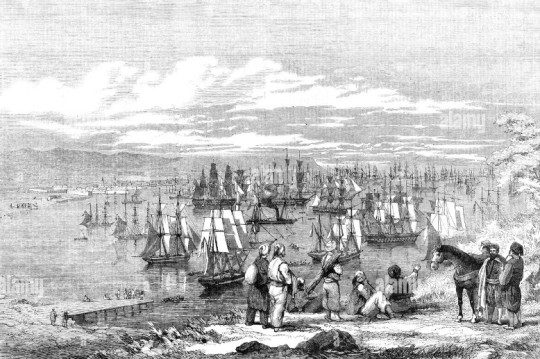
Varnay Bay, 1854

1860, largest city and seaside resort on the Bulgarian Black Sea Coast
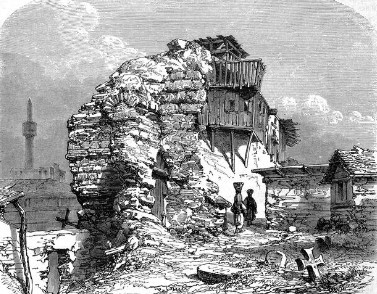
Ruins of ancient Roman palace
190 notes
·
View notes
Text
While the barricade is still holding on, Hugo decides that this is his last chance to write about other barricades which he ordered to be taken by siege in June 1848. To make sense of what is going on, I read a chapter about Hugo in Jonathan Beecher’s Writers and Revolution: Intellectuals and the French Revolution of 1848 (2021). “Victor Hugo never forgot what he saw and did between June 22–26. Unlike our other writers, he participated in the fighting, and he did so on the side of the government.” Sigh.
This is where his lengthy explanations about the differences between uprisings and insurrections from 4.10.2 become relevant. He genuinely believed that everything that was going on in February 1848, before the abdication of Louise Philippe was revolution (insurrection), and what followed in June was uprising against the Republic. It was “a revolt of the people against itself.”
The problem was: people had legitimate causes to rebel. “Once settled in the Assembly, Hugo was immediately confronted by the question of the National Workshops. Like many on both the right and the left, he believed the Workshops were a disaster. They produced nothing and were “an enormous waste of resources”… he urged that they be closed… He apparently believed that by voting to dissolve the National Workshops, he was not voting to shelve the question of unemployment. He was wrong.” Moreover, when workers erected the barricades and the confrontation began, “Hugo seems to have convinced himself that the best way to limit bloodshed was to defeat the insurrection rapidly. For the next three days he became a tiger, “haranguing insurgents, storming barricades, taking prisoners, and somehow remaining alive.”
According to an account from a member of the National Guard, Hugo was acting suicidally: “This man... was M. Victor Hugo, a representative for Paris. He was unarmed and nonetheless he led us; and while we took cover behind houses, he alone kept to the middle of the street. Twice I tugged at his sleeve, telling him: “You’ll get yourself killed!” “That is why I am here.”” But this was because he believed that he was acting under divine protection.
During these days, Hugo was not able to contact his wife and his mistress. He heard rumours that his house was burnt down, but finally found out that it was not true: “When he finally got back to the Place des Vôsges, he found fourteen bullet holes around carriage entrance, but everything in the house was intact: rugs, furniture, silverware, wall hangings, ancient swords and muskets, and above all his manuscripts. A leader of the insurgents, a school teacher and a reader of Hugo, had even led tours of the house for other insurgents.” The last detail is heartbreaking.
In this chapter, Hugo conveys his point of view on the events of June 1848, infusing them with symbolic images of two barricades: both quite eerie and ominous. He is exploiting his talent of horror writer again: “The Saint-Antoine barricade was the tumult of thunders; the barricade of the Temple was silence. The difference between these two redoubts was the difference between the formidable and the sinister. One seemed a maw; the other a mask.”
The sad thing is that after this chapter with its context in Hugo’s biography, it is hard to read his depiction of other barricades from other time without thinking of him as a hypocrite. This is Hugo — an embodiment of controversy.
Siege of the barricade during the June days of 1848:

#les mis letters#lm 5.1.1#les miserables#hugo's involvement in the june days of 1848#historical context
76 notes
·
View notes
Text

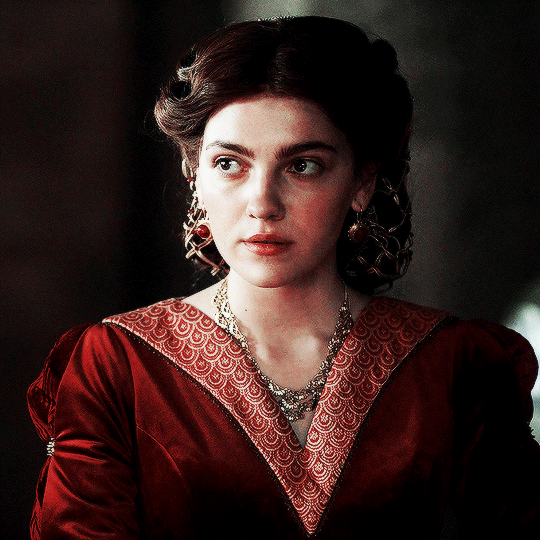

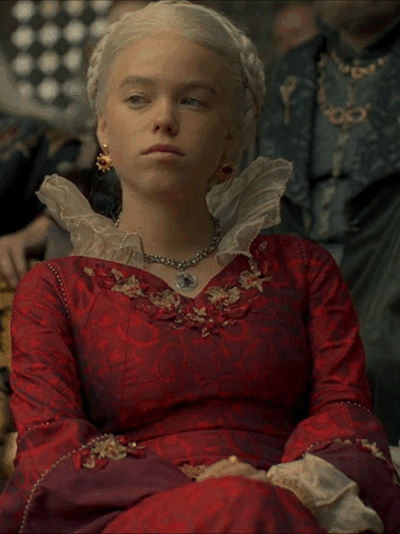



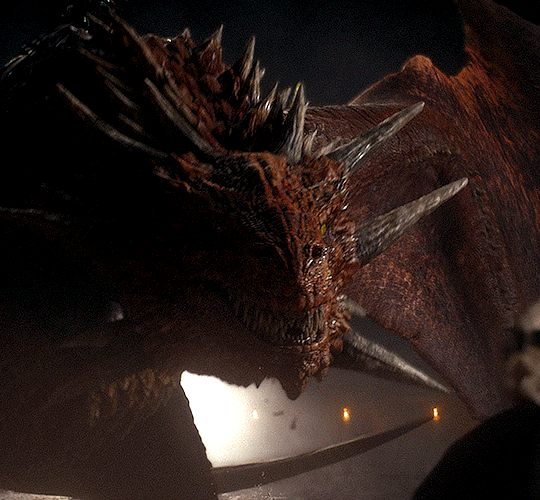

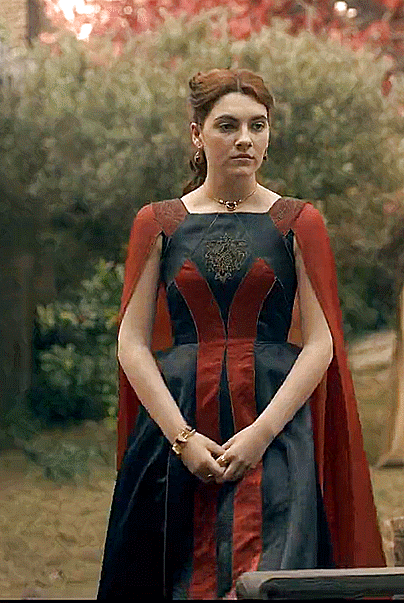

COLORS, SYMBOLISM AND HISTORICAL PARALLELS
RED
• After the fall of the Western Roman Empire, red was adopted as a color of majesty and authority by the Byzantine Empire, and the princes of Europe.
• In Western Europe, Emperor Charlemagne painted his palace red as a very visible symbol of his authority, and wore red shoes at his coronation.
• In western countries red is a symbol of martyrs and sacrifice, particularly because of its association with blood. Beginning in the Middle Ages, the Pope and Cardinals of the Roman Catholic Church wore red to symbolize the blood of Christ and the Christian martyrs.
#hotd#house of the dragon#house targaryen#the dance of the dragons#pre asoiaf#asoif/got#rhaenyra targaryen#daemon x rhaenyra#medieval history#history#historical context#queen alicent#alicent hightower#team black#fantasy costume#medieval costume#fantasy#daemon targaryen#daemyra
110 notes
·
View notes
Text
All credit to the wonderful @ferociousconscience for pointing me toward some fascinating background information and additional insights about Magnon in the cut chapter 'Further Adventures of M. Tholomyès' [source]!
This omitted section provides us with further context evidencing that, prior to her scheme involving the mômes in 1832, Magnon had been employing similar tactics and using children to manipulate circumstances to her advantage for many years. Interestingly, Hugo even draws parallels to real-life happenings of the time and briefly ties the character within a wider narrative: 'To those who would find such existences unbelievable, it suffices to respond that they are real.'

Not only do we gain newfound insight here into Magnon's deceitful past and personal affairs when she was 'hardy' and 'young', but this cut chapter also reveals just how long-standing her connection to the Thénardier family really is (a detail which is eluded to in the final novel, but never fully explained).
In fact, the focus of this chapter actually involves Magnon being lent Cosette by Monsieur and Madame Thénardier (for only 3 francs!) so that she can convince the municipal welfare office that she has a child. However, by coincidence, when making her way to the town hall with Cosette, Magnon stumbles upon the wedding ceremony of none other than Tholomyès… resulting in a heartbreaking incident where Cosette recognises her father and calls after him.
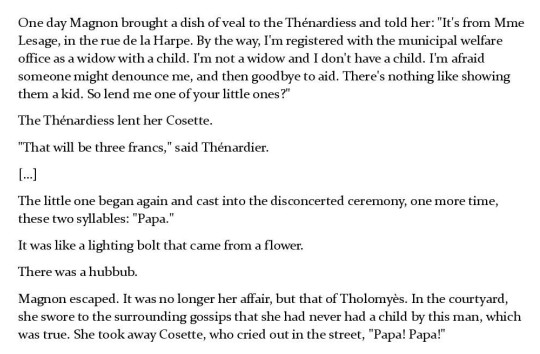
I love the deeper insight we get into Magnon's criminality and deceitfulness in these unpublished sections (which, in turn, also helps to emphasise the influence of gender and patriarchal ideals in shaping a perceived sphere of 'Women's Crime' during this period— where it was commonly assumed that women generally committed less violent but more exploitative crimes in comparison to men).
Moreover, I find this additional information about Magnon particularly interesting in light of the fact that, at one stage in the novel's drafting progress, she may have also been intended as Brujon's mother [more info here], originally being given the name La Brujon instead of La Magnon. I'm completely fascinated by the different avenues this character might have been taken if Hugo changed his mind before publication!
#magnon#les miserables#les mis#the brick#cut content#meta#the original manuscript#women and crime#historical context
45 notes
·
View notes
Text
I know we've all moved on from Mina's Brief Foray into Misogyny in favour of Jonathan Is Back, Hooray! but
I do think it's interesting to read real contemporary women's views on the early women's rights movement, and honestly Bram Stoker's depiction of how Mina sees things isn't all that far off (i.e. he's not just writing her that way because he's a clueless man).
A while ago, I read the memoirs of Maud Allan, an Edwardian dancer who lived a truly fascinating and often tragic life; it's worth reading her whole Wikipedia page. Her memoirs, published 1908, are not particularly worth reading (they were primarily publicity material), but there is one section where she talks about her views on women's suffrage.
Maud Allan was a highly educated, often controversial figure, who danced topless but for some intricate jewellery. She made her own living, and was most likely a lesbian - so all in all, much like Mina, not someone you would think of as likely to be ambivalent on gender equality. Nonetheless, she argued:
Women should "influence rather than dictate"
Women should be educated; she did not believe there was any difference between male and female intelligence, only in the opportunities they received
The rightful destiny of every woman was to be a wife and mother [even though she was neither]
Women were swayed by emotion more than men, so shouldn't become lawyers
Women would be swayed by the looks and personality of a political candidate, not by his views
As a result, in most areas men and women should be equal - but not in terms of the franchise, or at least not yet.
(The whole chapter is here).
I find this fascinating because from a modern-day perspective, it's so obviously inconsistent and muddled, in particular the sense of gender equality as a kind of grab-bag where women should be equal in some areas but not others. But these were the honest views of an educated, independent woman, and I could imagine a real-world Mina having a similar set of views.
886 notes
·
View notes
Text
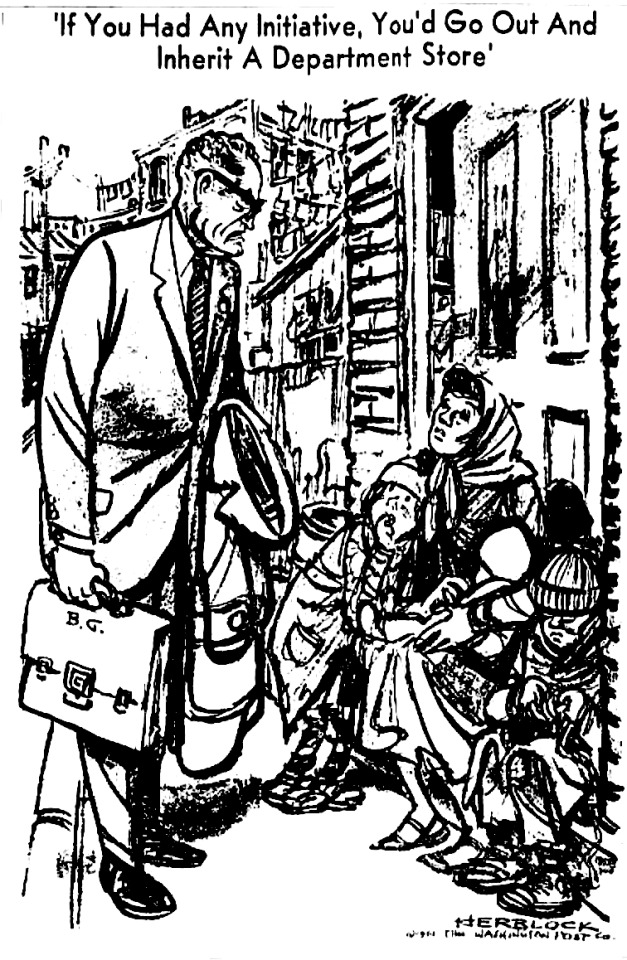
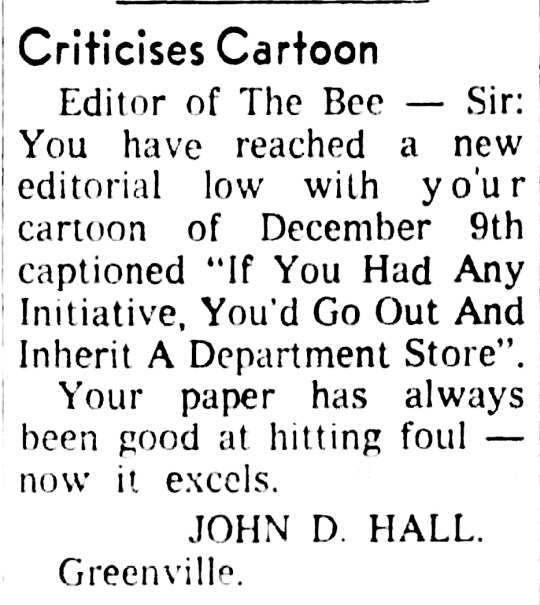

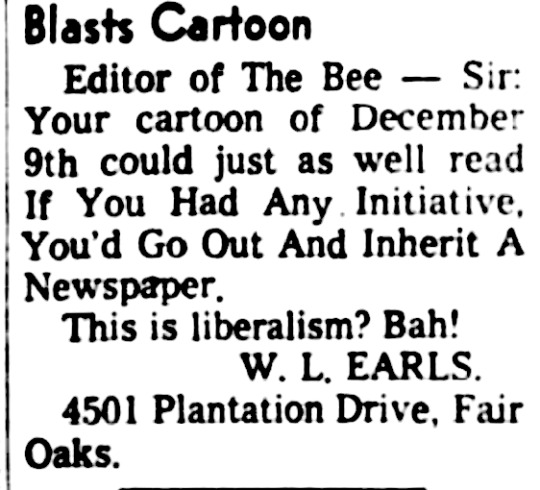




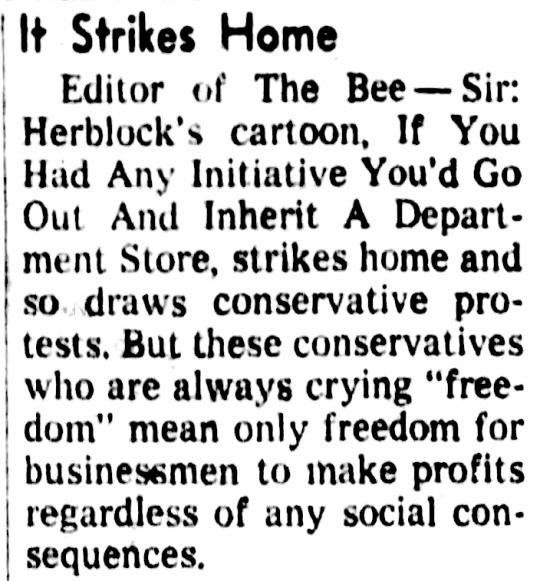
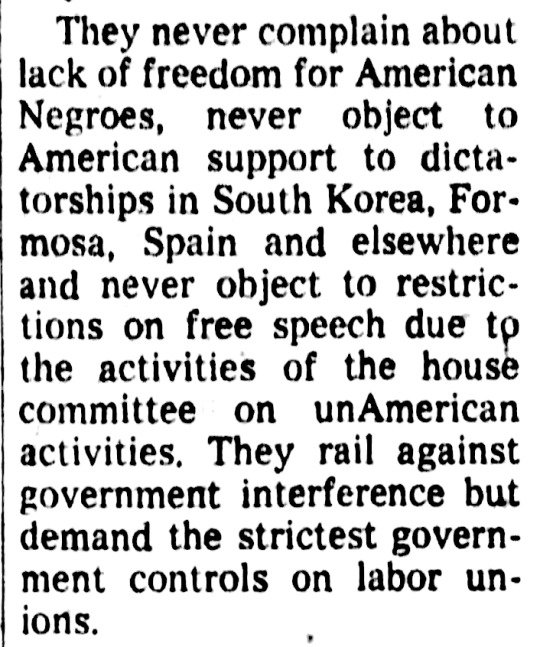

December 1961.
#barry goldwater#america#historical context#letters to the editor#john birch society#think tank#heritage foundation#herblock#comics#history of political comedy
1K notes
·
View notes
Text
On 13 July passed Cape Matapan. Crew dissatisfied about something. Seemed scared, but would not speak out.
On July 13th, the crew of the Demeter gets their very first dark premonition while passing Cape Matapan. The next day the first incident among them happens, followed by the first disappearance.
Cape Matapan, aka Cape Tainaron, is the southernmost place in continental Greece, and gateway to Hades.
There was a sanctuary of Poseidon there (ancient captains sailing past the Cape would stop to ask for a smooth sail), and a Nekromanteion (death oracle) or a Psychopompeion, because the Cape was a threshold to the Underworld.
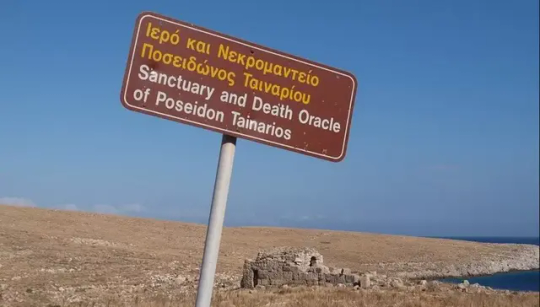
Greek sailors have been traditionally using the phrase "Stay forty miles away [meaning as far as possible] from Cape Matapan" ("Από τον Κάβο Ματαπά σαράντα μίλια μακρυά"), likely due to it once being a pirate hideout, as it's associated with bad luck.
#not to be confused with the gate to hades and death oracle in westernmost of continental greece by the acheron river#also while poseidon was the god of the sea he was very much associated with the underworld too especially in pre homeric times#dracula daily#historical context#dracula#the demeter#greece#peloponnese#the captain of the demeter#re: dracula
453 notes
·
View notes
Text

#white identity#identity politics#america#history#1619#racial identity#social dynamics#racial politics#historical context#white supremacy#racism#social justice#equality#end hate#anti-racism#racial equality#stop racism#no to hate#dismantle racism
102 notes
·
View notes
Text
BLU Spy headcanon and Sniper pee
What if… BLU Spy was from rural France originally, and not the city?
Because the way he acts, you would assume he’d throw a hissy fit over getting dirt under his nails or something minor like that…
But what if it’s an act? As stuck up as he is, he pretends to be grossed out and prissy about everyday messes to keep up his image. And the only thing that actually grosses him out is human waste like Sniper pee?
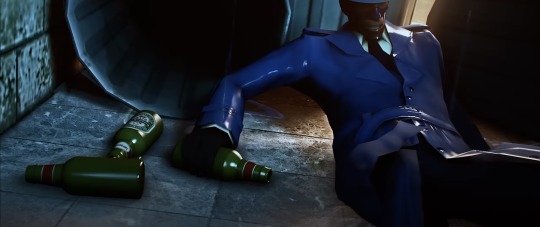
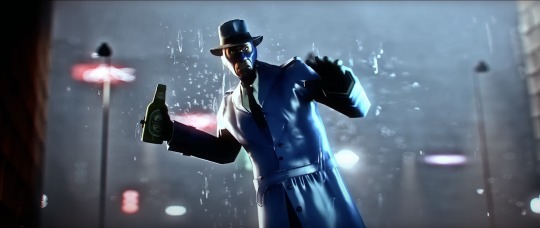
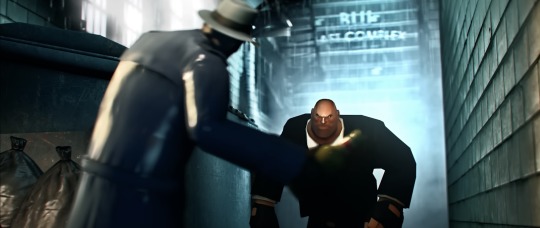
[Throwing dirty bottles from the trash]
Think about it. He doesn’t tell people his name or where he’s from, he doesn’t let them see his face, and he tries to stay aloof. Even to someone as friendly as Soldier. Wouldn’t it make sense to play a part that doesn’t fit your background, so people couldn’t use your behavior to extrapolate your origin?
Animals are not clean, they poop and pee wherever it seems right to them and it accumulates. Farm animals included. And beyond that, gardening and farming requires you to get your hands up in the dirt. But that’s nature, animals don’t have souls and human intelligence. We know what viruses and diseases are; livestock, wildlife and pets do not.
So, in the absence of his suit or reasons to pretend to be a germaphobe, it wouldn’t bother BLU Spy to clean up a horse stable; they need their feces to be taken away so they don’t get worms. It wouldn't bother him to give food scraps to pigs or chickens, and it wouldn’t bother him to get the eggs from the coop.
Walking around cow patties in a field, helping a farm animal with a difficult delivery, and fertilizing a garden or field would not bother him. Killing a farm animal and preparing it to be cooked would not make him squeamish.
But Sniper is a grown man who throws his pee at people intentionally. And to BLU Spy, that’s extra nasty because how does an adult think that’s acceptable behavior? It’s waste; it’s water with all the toxins and ammonia and refuse that your body doesn’t use for energy. And it can make you sick if you get it in an open wound [likely on the battlefield] or drink it, which Snipes may well do.
And it’s probably worse considering the fact that Sniper takes those kidney enlarging pills; they may not be filtering waste out of the body like they were meant to do. I think that when RED Medic brought him back, he replaced his messed up kidneys with some from an exotic animal, since he wouldn’t have gotten the chance prior.
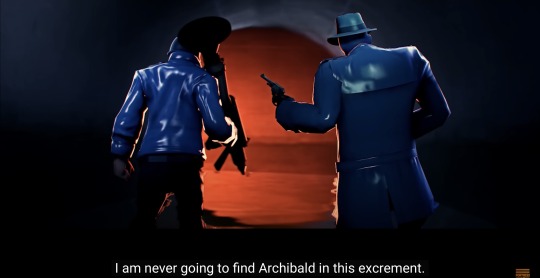
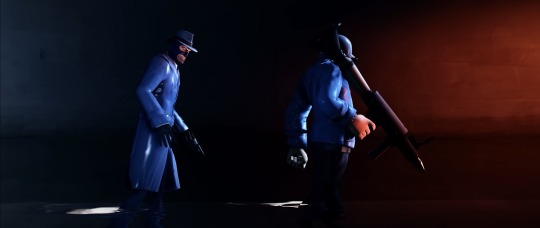
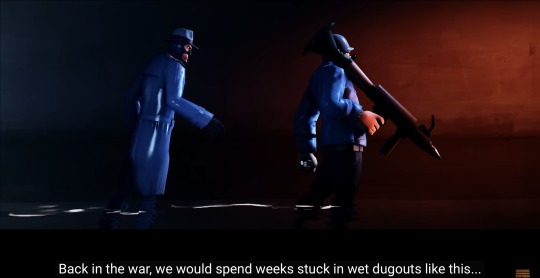
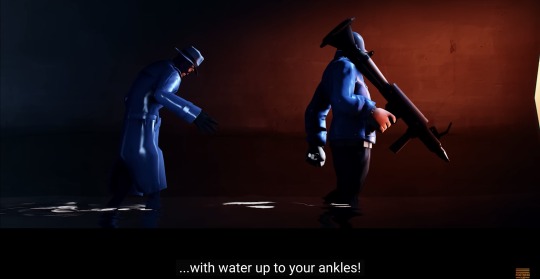
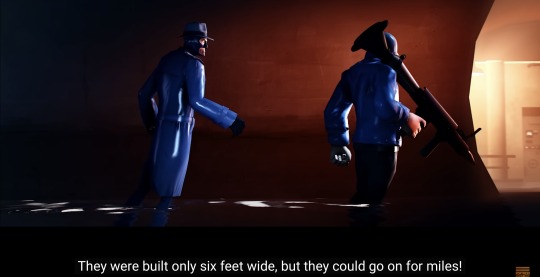
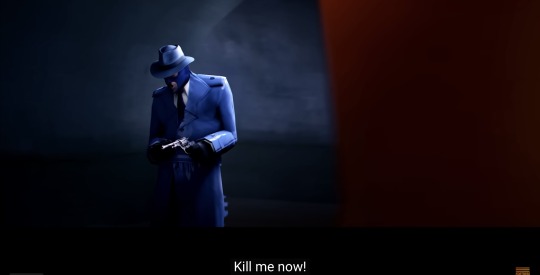
This is an interesting interaction for a few reasons.
The sewage they’re currently walking in is up to Soldier’s knees and almost Spy’s.
Soldier is talking about trench warfare, which is notorious for wet sloppy ground and rats causing gangrene and other illnesses. But the way he talks about it makes it sound less terrible than the situation they’re currently in. I think he was just trying to make conversation, not tell Spy to get over himself because he’s been through worse.
2. Soldier is looking straight ahead while Spy is looking into the water to watch his steps.
Sewage pipes are meant to take feces, pee, and toilet paper away from people to keep them from getting sick. But animals such as rats and random trash end up in the sewers; and given their location, they may well step on a fallen gun, bullets, or an engineer’s tools by mistake.
They’re both being smart in different ways; Soldier is watching for enemies ahead, and Spy is watching for objects that might go through his shoe and cause an infection. Or cause him to slip and get more sewage on himself.
3. In WWI, trench warfare was concentrated in France.
The Germans were trying to take Paris, and the French fought fiercely in the countryside between the city and Belgium, which had already fallen and been razed. WWI had more trench warfare, because the inventions needed to break a stalemate between two trenches of enemy soldiers had to be developed during those years. Chemical warfare like the use of Mustard gas was not condemned legally until after the war at the Geneva convention.
Meanwhile, America was ever the land far away that didn’t suffer the same effects on their land. Their soldiers died, their elderly and children did not. Their farms were not scarred with razor wire and trenches and bullets. But those scars were concentrated in France.
So to Spy -who did not live through the first war, but did hear the stories, and of the rebuilding, and live through WWII- Soldier is the one who hasn’t really been through it. War is hell on all soldiers, but it was a wildly different experience for a foreigner to come in, help, and go back to the land of plenty, than to be a citizen of one of the countries invaded by the N*zis.
4. In WWII, France fell to Germany in stark contrast to their valiant performance in WWI. The Resistance and anyone who tried to save persecuted undesirables were about the only people who showed courage.
I won’t go into so much detail here, since this will be relevant in my Emesis Blue fanfic later, but you should know that the country of France was not heroic and brave in WWII. It brought great shame on their people, even if it was mostly forgotten by the rest of the world later.
So in a way, Soldier being someone who kept up the fight against the Germans makes him “better” than the French military, alongside his platoon. But he would also be unaware of the wider hardships faced by the people of France during those years, as someone who was rushing to stop Germany and on the frontlines. He didn’t live in a village or city in Europe, living the misfortune of the civilians who called that country home. And he didn’t live through the years after the war, when these countries had to rebuild.
Him looking forward and ignoring whatever might be in the water is a good representation of this. So is the fact that he’s the one in front, setting their pace, while Spy is lagging a little.
#tf2#emesis blue#tf2 spy#tf2 soldier#character analysis#this started out lighthearted and got sad quick.#Angst#historical context
37 notes
·
View notes